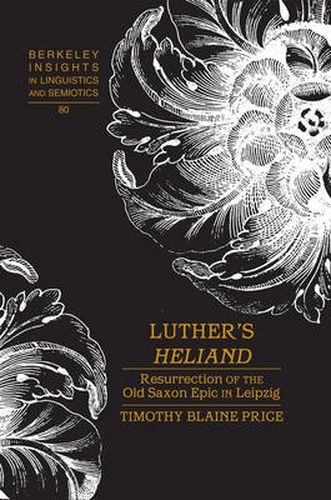Readings Newsletter
Become a Readings Member to make your shopping experience even easier.
Sign in or sign up for free!
You’re not far away from qualifying for FREE standard shipping within Australia
You’ve qualified for FREE standard shipping within Australia
The cart is loading…






This title is printed to order. This book may have been self-published. If so, we cannot guarantee the quality of the content. In the main most books will have gone through the editing process however some may not. We therefore suggest that you be aware of this before ordering this book. If in doubt check either the author or publisher’s details as we are unable to accept any returns unless they are faulty. Please contact us if you have any questions.
The 2006 discovery of the Old Saxon Heliand manuscript fragment (MS L) in Leipzig is conspicuous. Besides its proximity to Wittenberg, the Leipzig University Library - site of the discovery - was first dedicated by Martin Luther in 1545. Given this relationship between the Reformer and the discovery location, it seems possible that the Reformer once had access to an original version of the Old Saxon Heliand, perhaps as an aid in his efforts to render Biblical Hebraisms into vernacular German idioms at a time of budding German nationalism. Indeed, long before the Old Saxon epic received the name by which it is currently known, rumors arose about Luther’s possession of an ancient vernacular Germanic Bible with a Latin preface. Even so, the source and age of these rumors are enigmatic. Were these rumors merely a myth created by later Protestants to counter Rome’s denunciation of Luther as a heretic?
Following the trail of the rumors’ sources, Luther’s Heliand untangles historical relationships between the builders of the Leipzig University Library and several of their students - all men who comprised Luther’s innermost circle of Reformation thinkers. In their student notes, letters to colleagues, and printed diatribes against the Church and the Empire, these men recorded vital hints regarding the timing and location of their own discovery of the ancient Germanic Bible. Dating of these published accounts indicates that already several years prior to its dedication by Luther, the fledgling Leipzig University Library housed a medieval codex with features identical to those of the extant Old Saxon Heliand manuscripts, in particular MS L.
$9.00 standard shipping within Australia
FREE standard shipping within Australia for orders over $100.00
Express & International shipping calculated at checkout
This title is printed to order. This book may have been self-published. If so, we cannot guarantee the quality of the content. In the main most books will have gone through the editing process however some may not. We therefore suggest that you be aware of this before ordering this book. If in doubt check either the author or publisher’s details as we are unable to accept any returns unless they are faulty. Please contact us if you have any questions.
The 2006 discovery of the Old Saxon Heliand manuscript fragment (MS L) in Leipzig is conspicuous. Besides its proximity to Wittenberg, the Leipzig University Library - site of the discovery - was first dedicated by Martin Luther in 1545. Given this relationship between the Reformer and the discovery location, it seems possible that the Reformer once had access to an original version of the Old Saxon Heliand, perhaps as an aid in his efforts to render Biblical Hebraisms into vernacular German idioms at a time of budding German nationalism. Indeed, long before the Old Saxon epic received the name by which it is currently known, rumors arose about Luther’s possession of an ancient vernacular Germanic Bible with a Latin preface. Even so, the source and age of these rumors are enigmatic. Were these rumors merely a myth created by later Protestants to counter Rome’s denunciation of Luther as a heretic?
Following the trail of the rumors’ sources, Luther’s Heliand untangles historical relationships between the builders of the Leipzig University Library and several of their students - all men who comprised Luther’s innermost circle of Reformation thinkers. In their student notes, letters to colleagues, and printed diatribes against the Church and the Empire, these men recorded vital hints regarding the timing and location of their own discovery of the ancient Germanic Bible. Dating of these published accounts indicates that already several years prior to its dedication by Luther, the fledgling Leipzig University Library housed a medieval codex with features identical to those of the extant Old Saxon Heliand manuscripts, in particular MS L.